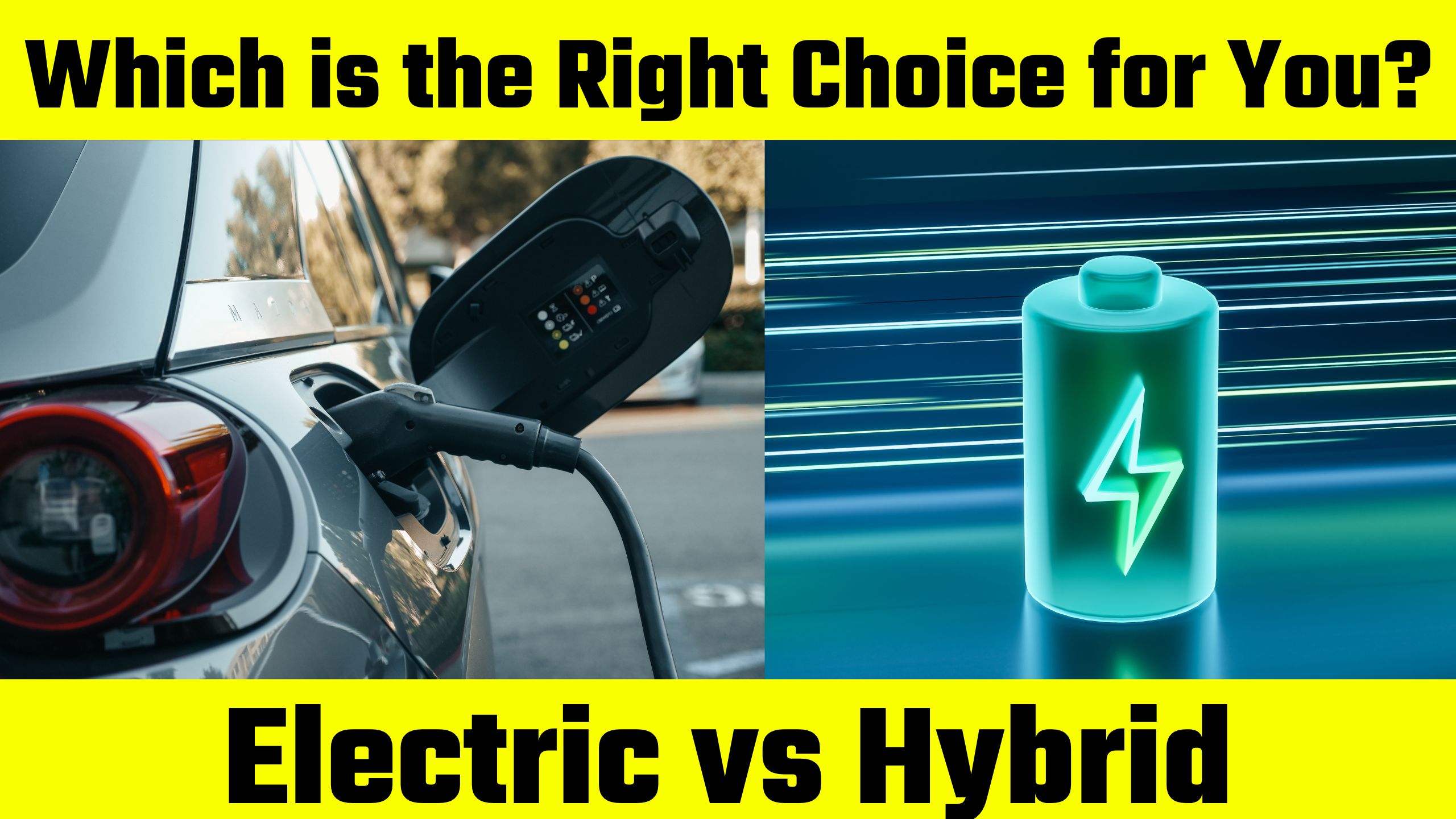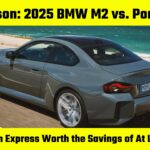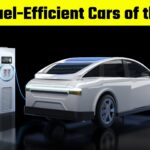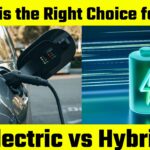The automotive landscape is undergoing a significant transformation with the rise of electric and hybrid vehicles.
As consumers become more environmentally conscious and fuel efficiency gains importance, choosing between an electric vehicle (EV) and a hybrid vehicle becomes a crucial decision.
This comprehensive guide explores the key differences, benefits, and considerations to help you determine which is the right choice for you.
Understanding Electric Vehicles (EVs)
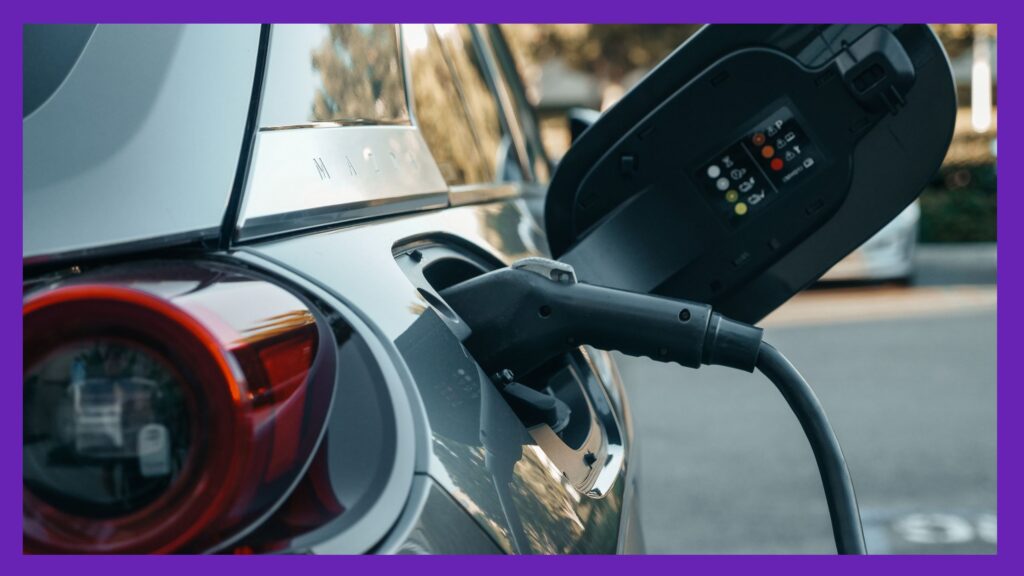
What Are Electric Vehicles?
Electric vehicles run entirely on electric power, utilizing a battery to store energy and an electric motor to drive the car. EVs need to be plugged into an external power source to recharge.
Benefits of Electric Vehicles:
- Zero Emissions: EVs produce no tailpipe emissions, making them environmentally friendly.
- Lower Operating Costs: Electricity is generally cheaper than gasoline, and EVs require less maintenance due to fewer moving parts.
- Quiet Operation: Electric motors operate quietly, providing a serene driving experience.
- Instant Torque: EVs offer quick acceleration due to the immediate torque from electric motors.
Popular Electric Vehicles:
- Tesla Model 3: Known for its range, performance, and advanced technology.
- Nissan Leaf: A more affordable option with solid range and practical features.
- Chevrolet Bolt EV: Offers a long range and spacious interior.
Understanding Hybrid Vehicles
What Are Hybrid Vehicles?
Hybrid vehicles combine a gasoline engine with an electric motor and battery. They can switch between or combine power sources to optimize efficiency.
Benefits of Hybrid Vehicles:
- Improved Fuel Efficiency: Hybrids offer better fuel economy than traditional gasoline cars by using electric power to assist the engine.
- Lower Emissions: Hybrids produce fewer emissions than conventional vehicles due to their efficient use of electric power.
- No Range Anxiety: Hybrids can run on gasoline when the battery is depleted, eliminating concerns about running out of charge.
- Smooth Driving Experience: The transition between electric and gasoline power is often seamless, providing a comfortable drive.
Popular Hybrid Vehicles:
- Toyota Prius: The quintessential hybrid known for its excellent fuel economy and reliability.
- Honda Accord Hybrid: Combines hybrid efficiency with the practicality of a midsize sedan.
- Ford Escape Hybrid: An SUV offering a balance of space, efficiency, and performance.
Key Considerations When Choosing Between Electric and Hybrid
1. Driving Habits:
- EVs: Ideal for daily commuting and city driving where charging infrastructure is readily available. Perfect for those with predictable driving patterns.
- Hybrids: Better suited for longer trips and rural areas where charging stations may be scarce. Ideal for those who drive varying distances.
2. Environmental Impact:
- EVs: Produce zero tailpipe emissions, making them the best choice for reducing your carbon footprint.
- Hybrids: Lower emissions than gasoline cars, but not as environmentally friendly as EVs.
3. Cost:
- EVs: Higher upfront costs but lower operating and maintenance expenses. Potential eligibility for tax incentives and rebates.
- Hybrids: Generally cheaper to purchase than EVs and more affordable than gasoline cars in the long run due to fuel savings.
4. Charging Infrastructure:
- EVs: Require access to charging stations at home, work, or public locations. Home charging setups can be an added expense.
- Hybrids: Do not rely on external charging, making them more convenient for those without easy access to charging stations.
5. Technology and Features:
- EVs: Often come with the latest tech features, including advanced infotainment systems, over-the-air updates, and autonomous driving capabilities.
- Hybrids: Typically include standard and optional features found in traditional cars, along with hybrid-specific technologies for efficiency.
Making the Decision: Electric vs. Hybrid
Scenario 1: The Urban Commuter
If you live in a city with a well-developed charging infrastructure and have a daily commute within the range of most EVs, an electric vehicle might be the perfect choice.
The environmental benefits and lower operating costs will be particularly advantageous.
Scenario 2: The Long-Distance Driver
For those who frequently travel long distances or live in areas with limited charging stations, a hybrid vehicle offers the best of both worlds.
You’ll enjoy improved fuel efficiency without the worry of finding a charging station on the go.
Scenario 3: The Eco-Conscious Consumer
If reducing your carbon footprint is a top priority, an EV’s zero-emission driving aligns with your environmental goals. However, if a fully electric car isn’t feasible, a hybrid still offers significant emissions reductions compared to a conventional vehicle.
Scenario 4: The Budget-Conscious Buyer
Consider the total cost of ownership, including purchase price, fuel, maintenance, and potential incentives.
While EVs have a higher initial cost, their long-term savings can be substantial. Hybrids offer a middle ground with better fuel economy than gas cars and lower upfront costs than many EVs.
Conclusion
Choosing between an electric and a hybrid vehicle depends on your unique driving habits, environmental priorities, budget, and access to charging infrastructure.
Both options offer compelling benefits and represent a step towards a more sustainable future. By evaluating your specific needs and preferences, you can make an informed decision that aligns with your lifestyle and contributes to a cleaner, greener planet.
Whether you opt for the cutting-edge technology of an EV or the balanced efficiency of a hybrid, you’re making a positive impact on the environment and your driving experience.
you can also check out Top 10 cars of 2024 with style and performance.
